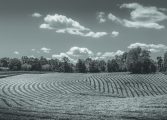By Page H. Gifford
Correspondent
Joe Fabiszewski Jr., better known as “Joe Fab”, is a producer, writer, and director, who has had the privilege of working with many well-known performers and public figures, including Tina Turner, Cher, Alison Krauss, Aretha Franklin, Maya Angelou, President Jimmy Carter, Senator Sam Nunn, Senator Howard Baker, James Carville, Mary Matalin, Placido Domingo, and Renee Fleming. And that is only a fraction of the list.
No doubt Fab, who lives in Lake Monticello, has many stories to tell about his encounters with these people but what is more intriguing is his creative mind delving into the lives and stories of ordinary Americans — less glamorous but infinitely more provocative.
Born in Baltimore and growing up in the Maryland suburbs around Washington D.C., Fab dropped out of college to work at a theater in Rockville, MD.
“It was my version of running away to join the circus,” said Fab, smiling. Since 1972, he built a career in entertainment and not long after married his wife, Kay in 1978. He continued working in live theater in management and producing. In the early 1980s, he was general manager of the Wax Museum Nightclub, which at the time was the largest club-style venue in Washington, DC, featuring many well know bands and entertainers.
As a freelancing producer, he produced live events, including theater as well as special events, in such diverse venues as the Kennedy Center, RFK Stadium, Ford’s Theater, the National Theater, the Source Theater, and other locations in DC. For almost two decades he wrote, produced, and sometimes staged the Lighting of the National Christmas Tree, in which Presidents George H. W. Bush, Bill Clinton, and George W. Bush participated. These shows were an hour long and produced live for television. Fab said these were a production challenge since they had internationally known artists on the program before the president delivered an address and the lighting the tree.
But it was in the late 1980s, Fab began embarking on a career in documentary film. His award-winning documentaries include “NOT The Last Butterfly,” “Bedford: The Town They Left Behind,” and “Paper Clips.”
In 2016, “NOT The Last Butterfly” focuses on The Butterfly Project, a non-profit organization using lessons of the Holocaust to educate people about the dangers of hatred and bigotry. There are 1.5 million painted butterflies displayed throughout the world, symbolizing the renewal of life.
“Bedford: the Town They Left Behind,” about the Bedford Boys from the Virginia town of the same name who lost an entire National Guard unit during World War II. But his best- known documentary, titled “Paper Clips,” was screened in over 160 theaters and was on HBO for a year, garnering over a dozen awards and an Emmy nomination.
“I became passionate about films in high school, where my drama teacher introduced me to classic films, from the silents through the golden age of movies. I began enjoying documentaries as a viewer after high school. My first film was “A Cry in The Woods,” about the struggle between environmentalists and the timber industry,” he said. “My work is inspired by fascinating people, people on a mission, people living out their purpose in life. I like to tell stories that stay with the viewer long after the last frame of the film has faded from the screen. These are stories that have a chance of changing lives.” Feb is not about celebrity, that’s obvious. He is about finding those extraordinary people who go the extra mile to make a difference in someone else’s life.
“Paper Clips,” is the story of children in a middle school in rural Tennessee.
“Because everyone in the tiny town is white and Christian, the principal realized that the students weren’t being prepared to go out and succeed in a much more diverse world. She looked for something to add to the curriculum that would teach them about other cultures. She chose the Holocaust because it would teach about Germans and Jews, none of which lived in the town, and about perhaps the worst example of what can happen when two cultures are unable to live together peacefully,” he said. “When the program began, one of the first things the students learned was that Hitler killed six million Jews. It was a number unfathomable to the students, who decided that to understand it they would try to get six million of something in front of them.”
One child found on the internet that some Norwegians would wear a paper clip under their lapel during World War II as a silent symbol of their resistance to the Nazis. So the students set out to collect six million paper clips.
“That is about the first five minutes of the film. What happens after that is inspiring and kind of miraculous. I was nominated for an Emmy for the film, and, while we lost out to a PBS film, I can tell you that it is an honor just to be nominated.”
His current documentary, “When My Time Comes” is a single one-hour program that will be broadcast on most PBS stations nationwide beginning this month.
“The film is about the controversial subject of medical aid in dying (MAID). MAID is an end-of-life option by which terminally ill patients who meet certain legal criteria can request medication from their physician to end their lives when they find their suffering unbearable. It is currently authorized in nine states and the District of Columbia, with a tenth state – New Mexico – expected to adopt it soon, possibly by the time this is printed.”
He made the film with Diane Rehm, the Peabody Award-winning NPR journalist, whose husband died a painful death in 2014 and for whom MAID was not available where he was living.
“We crossed the country interviewing people both pro and con — patients, family members, doctors, lawmakers. All of us will die, and COVID-19 has forced us all to consider death as something that could come sooner than we had thought,” he said. “This awareness makes the questions of how we die come into greater focus. Which in turn raises questions of patient autonomy: how much control will I have over my death? Who determines how much I’m suffering – me or my doctor? If my suffering is more than I can bear, what are my options, if any?” Check local listings for dates and times and it will also be streaming on most PBS station websites.
Though Fab has been around celebrities and public figures, he is more impressed by the children in Tennessee, the heroes of the first day of the D-Day invasion, which he says were both courageous and humble, and Holocaust survivors inspiring teachers.
“All of these people and many others from my other projects taught me that ordinary people can often rise to surmount challenging obstacles.”
Fab is taking a break for a few months.
“There are a few documentary projects I’m considering and also a book and screenplay that I’d like to write. I haven’t decided what to do next, but there are plenty of possibilities.”




